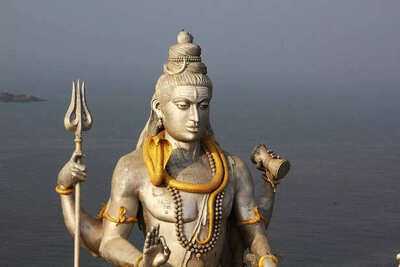
Have you ever wondered why Shiva, the serene yet fierce yogi, is known as Neelkanth, the Blue-Throated One? This isn’t just a myth about gods and demons fighting over immortality. It’s a powerful reminder that sometimes, the bitterness we face in life must be contained within us so it doesn’t spread and destroy what we hold dear.
Long ago, the Devas (gods) and Asuras (demons) churned the cosmic Ocean of Milk to find the nectar of immortality. They found treasures, hope, and beauty — but before the nectar appeared, a deadly poison rose from the depths, threatening to wipe out all existence. It was so terrifying that these sworn enemies did something they had never done before: they stood side by side, humbled, and turned to Shiva for help.
This is the story of the moment when even the mightiest realised they needed someone beyond rivalry and fear. It’s the story of how Shiva drank the poison that no one else could contain, and how that blue throat still whispers to us about courage, sacrifice, and inner strength every time life churns up its own poison. 1. Why Did Devas and Asuras Unite?
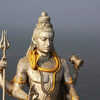
The Devas and Asuras were ancient cosmic rivals, constantly at war for power and immortality. Over time, their battles drained their energy. They learned that the nectar of immortality, Amrit, lay hidden in the depths of the Kshira Sagara — the Ocean of Milk. But to obtain it, they needed each other. This is why they formed an uneasy alliance to churn the ocean together — proof that sometimes, even the fiercest enemies must cooperate when survival is at stake. 2. What Was the Samudra Manthan?
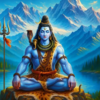
Samudra Manthan means the Churning of the Ocean. It was an extraordinary event where the Devas and Asuras used Mount Mandara as a churning rod and the serpent Vasuki as the rope. Vishnu, in his Kurma (tortoise) form, supported the mountain on his back. As they churned, countless divine treasures and beings emerged. But the ocean held not just Amrit, but also unimaginable danger. 3. What Is Halahala — the Deadly Poison?
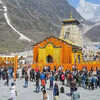
Before the nectar surfaced, the ocean spewed out Halahala, a dark and lethal poison so potent that its fumes alone could destroy the entire universe. Neither the Devas nor the Asuras had the power to neutralise it. As the poison spread through the heavens and the earth, panic gripped both sides. Their combined efforts could churn the ocean but not stop the poison they had unleashed. 4. Why Did They Turn to Shiva? In their desperation, the Devas and Asuras remembered that only one being could face what no one else could — Shiva, the detached Yogi who watched the universe from afar but always intervened when balance was threatened. Both groups approached him on Mount Kailash. For once, gods and demons knelt side by side, admitting that their powers were not enough to save creation. 5. How Did Shiva Become Neelkanth?
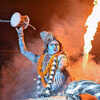
Shiva heard their pleas and saw the suffering that the spreading poison would cause. He did not fight the poison — instead, he gathered it in his hands and drank it. To protect him, his consort Parvati held his throat so that the poison would not sink into his heart. The Halahala lodged in his throat, turning it deep blue. From that moment on, Shiva became known as Neelkanth, which means “The Blue-Throated One.” 6. What Does Neelkanth Symbolise? Neelkanth is more than a title — it’s a timeless symbol. It teaches that true strength lies in the ability to contain life’s bitterness without letting it poison the heart. Shiva did not destroy the poison; he absorbed it and transformed it into a symbol of cosmic balance. This idea shows us how we too can handle life’s negativity — by holding it mindfully, not letting it consume us, and protecting our inner calm. 7. Why Did This Event Matter for the World? By containing the poison, Shiva saved the entire universe from destruction. Without his sacrifice, there would have been no chance for the Devas and Asuras to obtain Amrit. The nectar of immortality was only possible because the poison was first absorbed. The lesson is clear — sometimes, the greatest gifts emerge only after someone bears the burdens others cannot carry. The Legacy of Neelkanth When we remember Shiva as Neelkanth, we are reminded that facing life’s toxins — anger, hatred, envy — requires strength, compassion, and detachment. Even today, the story whispers to us that true power is not about destroying others but about transforming what can destroy us from within.
In a world that continues to churn, may we find the courage to hold the poison and still keep our hearts pure.
Har Har Mahadev
 Have you ever wondered why Shiva, the serene yet fierce yogi, is known as Neelkanth, the Blue-Throated One? This isn’t just a myth about gods and demons fighting over immortality. It’s a powerful reminder that sometimes, the bitterness we face in life must be contained within us so it doesn’t spread and destroy what we hold dear.
Have you ever wondered why Shiva, the serene yet fierce yogi, is known as Neelkanth, the Blue-Throated One? This isn’t just a myth about gods and demons fighting over immortality. It’s a powerful reminder that sometimes, the bitterness we face in life must be contained within us so it doesn’t spread and destroy what we hold dear.
 The Devas and Asuras were ancient cosmic rivals, constantly at war for power and immortality. Over time, their battles drained their energy. They learned that the nectar of immortality, Amrit, lay hidden in the depths of the Kshira Sagara — the Ocean of Milk. But to obtain it, they needed each other. This is why they formed an uneasy alliance to churn the ocean together — proof that sometimes, even the fiercest enemies must cooperate when survival is at stake. 2. What Was the Samudra Manthan?
The Devas and Asuras were ancient cosmic rivals, constantly at war for power and immortality. Over time, their battles drained their energy. They learned that the nectar of immortality, Amrit, lay hidden in the depths of the Kshira Sagara — the Ocean of Milk. But to obtain it, they needed each other. This is why they formed an uneasy alliance to churn the ocean together — proof that sometimes, even the fiercest enemies must cooperate when survival is at stake. 2. What Was the Samudra Manthan?
 Samudra Manthan means the Churning of the Ocean. It was an extraordinary event where the Devas and Asuras used Mount Mandara as a churning rod and the serpent Vasuki as the rope. Vishnu, in his Kurma (tortoise) form, supported the mountain on his back. As they churned, countless divine treasures and beings emerged. But the ocean held not just Amrit, but also unimaginable danger. 3. What Is Halahala — the Deadly Poison?
Samudra Manthan means the Churning of the Ocean. It was an extraordinary event where the Devas and Asuras used Mount Mandara as a churning rod and the serpent Vasuki as the rope. Vishnu, in his Kurma (tortoise) form, supported the mountain on his back. As they churned, countless divine treasures and beings emerged. But the ocean held not just Amrit, but also unimaginable danger. 3. What Is Halahala — the Deadly Poison?
 Before the nectar surfaced, the ocean spewed out Halahala, a dark and lethal poison so potent that its fumes alone could destroy the entire universe. Neither the Devas nor the Asuras had the power to neutralise it. As the poison spread through the heavens and the earth, panic gripped both sides. Their combined efforts could churn the ocean but not stop the poison they had unleashed. 4. Why Did They Turn to Shiva? In their desperation, the Devas and Asuras remembered that only one being could face what no one else could — Shiva, the detached Yogi who watched the universe from afar but always intervened when balance was threatened. Both groups approached him on Mount Kailash. For once, gods and demons knelt side by side, admitting that their powers were not enough to save creation. 5. How Did Shiva Become Neelkanth?
Before the nectar surfaced, the ocean spewed out Halahala, a dark and lethal poison so potent that its fumes alone could destroy the entire universe. Neither the Devas nor the Asuras had the power to neutralise it. As the poison spread through the heavens and the earth, panic gripped both sides. Their combined efforts could churn the ocean but not stop the poison they had unleashed. 4. Why Did They Turn to Shiva? In their desperation, the Devas and Asuras remembered that only one being could face what no one else could — Shiva, the detached Yogi who watched the universe from afar but always intervened when balance was threatened. Both groups approached him on Mount Kailash. For once, gods and demons knelt side by side, admitting that their powers were not enough to save creation. 5. How Did Shiva Become Neelkanth?
 Shiva heard their pleas and saw the suffering that the spreading poison would cause. He did not fight the poison — instead, he gathered it in his hands and drank it. To protect him, his consort Parvati held his throat so that the poison would not sink into his heart. The Halahala lodged in his throat, turning it deep blue. From that moment on, Shiva became known as Neelkanth, which means “The Blue-Throated One.” 6. What Does Neelkanth Symbolise? Neelkanth is more than a title — it’s a timeless symbol. It teaches that true strength lies in the ability to contain life’s bitterness without letting it poison the heart. Shiva did not destroy the poison; he absorbed it and transformed it into a symbol of cosmic balance. This idea shows us how we too can handle life’s negativity — by holding it mindfully, not letting it consume us, and protecting our inner calm. 7. Why Did This Event Matter for the World? By containing the poison, Shiva saved the entire universe from destruction. Without his sacrifice, there would have been no chance for the Devas and Asuras to obtain Amrit. The nectar of immortality was only possible because the poison was first absorbed. The lesson is clear — sometimes, the greatest gifts emerge only after someone bears the burdens others cannot carry. The Legacy of Neelkanth When we remember Shiva as Neelkanth, we are reminded that facing life’s toxins — anger, hatred, envy — requires strength, compassion, and detachment. Even today, the story whispers to us that true power is not about destroying others but about transforming what can destroy us from within.
Shiva heard their pleas and saw the suffering that the spreading poison would cause. He did not fight the poison — instead, he gathered it in his hands and drank it. To protect him, his consort Parvati held his throat so that the poison would not sink into his heart. The Halahala lodged in his throat, turning it deep blue. From that moment on, Shiva became known as Neelkanth, which means “The Blue-Throated One.” 6. What Does Neelkanth Symbolise? Neelkanth is more than a title — it’s a timeless symbol. It teaches that true strength lies in the ability to contain life’s bitterness without letting it poison the heart. Shiva did not destroy the poison; he absorbed it and transformed it into a symbol of cosmic balance. This idea shows us how we too can handle life’s negativity — by holding it mindfully, not letting it consume us, and protecting our inner calm. 7. Why Did This Event Matter for the World? By containing the poison, Shiva saved the entire universe from destruction. Without his sacrifice, there would have been no chance for the Devas and Asuras to obtain Amrit. The nectar of immortality was only possible because the poison was first absorbed. The lesson is clear — sometimes, the greatest gifts emerge only after someone bears the burdens others cannot carry. The Legacy of Neelkanth When we remember Shiva as Neelkanth, we are reminded that facing life’s toxins — anger, hatred, envy — requires strength, compassion, and detachment. Even today, the story whispers to us that true power is not about destroying others but about transforming what can destroy us from within.